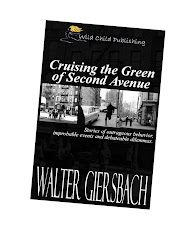The Rose and Thorn Journal was kind enough recently to publish “Test of English as a Foreign Language” (at http://www.roseandthornjournal.com/Spring_2012_Prose_1.html). It was a piece I felt strongly about, and it took the better part of five years to bring it to a publishable state.
Rose and Thorn has also asked — kindly, of course — what on earth I was thinking of. The germ of the story has gnawed at me for many years — since 1979 when I returned to Taiwan on a business trip. I met up then with my wife’s girlfriend who had married an American, lived several years in the States, and came back when her husband was reassigned to Taiwan. It was awkward when I saw her treated in Taipei’s marketplace as an American hwa-chiao (foreigner on a homeland visit), but as a bargirl when she tried calling her husband stationed at a military post.
She was no longer Taiwanese and not yet American. Of the many stories I know about bi-national people, this one stood out. And deserved to be shared.
I also wondered if perhaps we’re all expatriates of one sort of another as we swim through any murky pool filled with strangers. I’ve always had a creepy feeling about being a tourist — buying a vacation, looking confused in a new city, acting gawky and “foreign.” Perhaps it’s because I used to scorn the clots of vacationers clustered in midtown Manhattan, holding maps and looking at the skyscrapers as though God would be their Gray Lines tour guide. While I was in a suit and tie rushing across town on some mission of capital importance, I’d have to stumble and detour around these Ausländers in their blousy sports shirts and khaki shorts.
So add to the expatriate syndrome in “Test of English” the despair of a dead child and a divorced husband and you have the making of universal tension. Key to writing the story was the characters’ realizing how hard it is to be accepted. Rightly or wrongly, Shirley felt Americans were “predisposed to believe that American men only married bargirls.” Orville, too, had difficulty with his environment, saying, “It was all getting to me. The telephones and car horns. Fire sirens, even chatter at parties. It was all like a toothache. It was getting on my nerves.”
How can feeling like a stranger be otherwise when store clerks answer an expat’s question by turning to her spouse, when locals are perplexed by an unfamiliar accent, or when an in-law ingratiatingly says all children or women in [insert country name] are beautiful or intrinsically smart or better at sports? These are the preconceptions — if not prejudices — that all Asians are good at math (and, by extension, at gambling), that immigrants must all have come from a certain class or occupation, and that some people have in-born diet preferences.
Let me make a case that there’s a universal feeling of discomfort among expatriates, beginning with Moses coming back to Egypt announcing, “I have been a stranger in a strange land.” I’ll grant you, it’s easier to be an expatriate in the U.S. than in, say, an insular nation like Japan. America is a nation of immigrants. A Hungarian engineer once told me, “I worked in Germany for several years, but to them I was always a Hungarian. In the U.S., I’m called a ‘new American.’”
“Test of English as a Foreign Language” tries to approach this situation of apartness. Writers feel compelled to connect with people, to cross cultural bridges, and to obliterate barriers. Perhaps through writing and reading — passing our test of English as a foreign language — we can all become assimilated. For aren’t we all “new Americans” in one way or another?



No comments:
Post a Comment